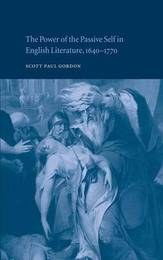
|
The Power of the Passive Self in English Literature, 1640-1770
Hardback
Main Details
| Title |
The Power of the Passive Self in English Literature, 1640-1770
|
| Authors and Contributors |
By (author) Scott Paul Gordon
|
| Physical Properties |
| Format:Hardback | | Pages:292 | | Dimensions(mm): Height 236,Width 159 |
|
| Category/Genre | Literary studies - c 1500 to c 1800
Philosophy of religion
History of science |
|---|
| ISBN/Barcode |
9780521810050
|
| Classifications | Dewey:820.9 |
|---|
| Audience | | Professional & Vocational | |
|---|
|
Publishing Details |
| Publisher |
Cambridge University Press
|
| Imprint |
Cambridge University Press
|
| Publication Date |
28 March 2002 |
| Publication Country |
United Kingdom
|
Description
Challenging recent work that contends that seventeenth-century English discourses privilege the notion of a self-enclosed, self-sufficient individual, The Power of the Passive Self in English Literature recovers a counter-tradition that imagines selves as more passively prompted than actively choosing. This tradition - which Scott Paul Gordon locates in seventeenth-century religious discourse, in early eighteenth-century moral philosophy, in mid eighteenth-century acting theory, and in the emergent novel - resists autonomy and defers agency from the individual to an external 'prompter'. Gordon argues that the trope of passivity aims to guarantee a disinterested self in a culture that was increasingly convinced that every deliberate action involves calculating one's own interest. Gordon traces the origins of such ideas from their roots in the non-conformist religious tradition to their flowering in one of the central texts of eighteenth-century literature, Samuel Richardson's Clarissa.
Author Biography
Scott Paul Gordon is an Associate Professor of English at Lehigh University. He has published numerous articles on seventeenth- and eighteenth-century subjects.
Reviews"The Power of the Passive Self is an impressive and original book that makes an important contribution to current scholarship on the origins of the modern individual." Eighteenth-Century Fiction
|